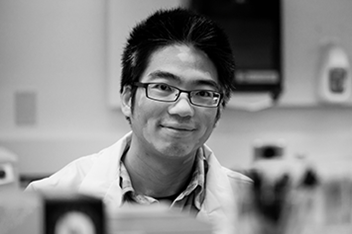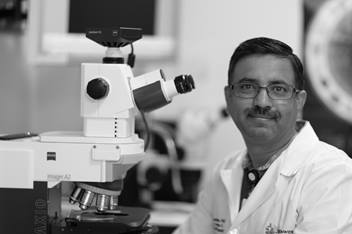Baker Lab
The Baker Lab is dedicated to studying the genetics of genitourinary congenital conditions, with a primary focus on Prune Belly Syndrome (PBS). PBS is an ultra-rare congenital disorder affecting muscle and connective tissue. It occurs in approximately 1 in 50,000 births, with over 95% of cases affecting males. Tragically, up to 20% of children with PBS do not survive past their second birthday.
This condition is characterized by a triad of clinical findings:
- A lax abdominal wall resulting from absent or insufficient abdominal skeletal muscle.
- A dilated and poorly emptying urinary tract, affecting the bladder, ureters, and kidneys, due to abnormal smooth muscle.
- Undescended testicles in affected males.
Children and adults living with PBS face a range of health challenges, including kidney damage or failure, urine incontinence, recurrent lung infections, chronic constipation, orthopedic (bone and joint) issues, and infertility. Managing this condition requires multiple surgeries and lifelong medical care to enhance appearance, health, and overall quality of life.
The underlying cause of PBS remains incompletely understood. The Baker Lab unites a multidisciplinary team of researchers and healthcare professionals at the forefront of basic-clinical research. Our collective mission is to delve into the genetic foundations of this condition, instilling hope and striving for improved outcomes for affected individuals and their families.
Our Current Projects
Our lab's ongoing research projects include:
| Project | Contributors | Funding |
| PBS Filamin A (Flna) mouse model studies |
Drs. Baker, Amado, and Jackson from Nationwide Children's Hospital, Drs. Ithychanda and Qin from Cleveland Clinic and Dr. Zent from Vanderbilt |
NIH R01 DK127589 |
| Defining the urinary bladder-specific functional enhancer landscape of Myocardin (Myocd) |
Drs. Jackson, McHugh, Baker, Amado, Stanton, and Theisen |
OSU-NCH intramural grant |
| Piezo1 mutations in PBS |
Dr. Syeda from University of Texas Southwestern and Drs. Baker and Amado from Nationwide Children's Hospital |
|
| Genetic basis of PBS and transcriptome studies* |
Drs. Baker and Amado from Nationwide Children's Hospital |
|
| Understanding the physical changes across the lifespan in Prune Belly Syndrome* |
Drs. Lowes, Tulchin-Francis, Amado, and Baker |
|
| Quantifying chest and abdominal abnormalities on imaging studies in PBS* |
Drs. Baker, Amado, McLeod, Parthasarathy, Stacy, Musini, and Adler |
*Currently recruiting prune belly syndrome individuals and families
Featured Publications
- PIEZO1 loss-of-function compound heterozygous mutations in the rare congenital human disorder Prune Belly Syndrome
- Kidney function and transplants in prune belly syndrome: a scoping review
- The utility of gene sequencing in identifying an underlying genetic disorder in prenatally suspected lower urinary tract obstruction
- Phenotypic Severity Scoring System and Categorization for Prune Belly Syndrome: Application to a Pilot Cohort of 50 Living Patients
- Copy Number Variations in a Population with Prune Belly Syndrome
- Impact and frequency of extra-genitourinary manifestations of prune belly syndrome
- A homozygous loss-of-function variant in MYH11 in a case with Megacystis-Microcolon-Intestinal-Hypoperistalsis Syndrome
- Genetic Basis of Prune Belly Syndrome: Screening the HNF1b gene
Our Current Lab Funding
- R01DK127589: Prune Belly Syndrome: Mechanisms of Filamin A Mutations. Principal investigator: Baker,L.
- Urology Care Foundation and the American Urological Association (UCF/AUA) Research Scholar grant: Mechanism of interaction of FLNA and MYOCD on smooth muscle development and association with Prune Belly Syndrome. Principal investigator: Amado, N.
- Nationwide/COM Cross-Campus Collaborative Pilot Program (NCH/OSU): Defining the urinary bladder-specific functional enhancer landscape of Myocardin (Myocd). Principal investigator(s): McHugh K and Baker, L.
- NCH-NURAG grant: Whole Exome Sequencing analysis of two multiplex families with lethal cases of Prune Belly Syndrome. Principal investigator(s): Amado, N. and Baker,L.
We Are Actively Recruiting
The Baker Lab is actively recruiting people and families to participate in our Nationwide Children’s Hospital IRB approved research study (Pediatric Genitourinary Blood, Tissue, Urine and DNA Biorepository) that aims to advance our understanding of genetics in various genitourinary conditions, including prune belly syndrome, pediatric kidney stone, cloacal exstrophy and others. While there is no direct benefit to you as a participant, your contribution will advance scientific knowledge and potentially lead to improved prevention, diagnosis, and treatment of the studied condition. Participation in this study is entirely voluntary. You are free to withdraw at any time without any penalty. Before deciding, we encourage you to read the full informed consent document and ask any questions you may have.
If you choose to participate, you will be asked to:
- Provide a sample of your blood and urine for genetic analysis.
- Complete a questionnaire about your medical history, lifestyle, and family health.
If you are interested in participating, please contact our team at PruneBellySyndrome@NationwideChildrens.org for more information.
Your privacy is of utmost importance to us. All data collected will be de-identified, meaning that your personal information will be kept confidential and not linked to your genetic data. We have stringent security measures in place to safeguard your information.
Thank you for your interest and support.



